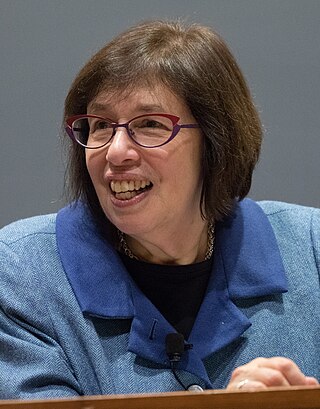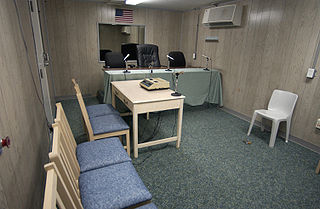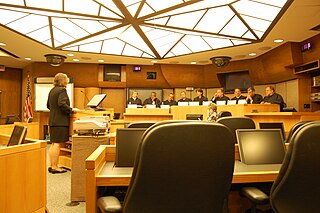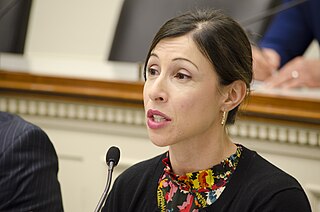
Eugene Roy Fidell (born March 31, 1945) is an American lawyer specializing in military law. [1] He is currently the Florence Rogatz Visiting Lecturer in Law at Yale Law School. [2] [3]

Eugene Roy Fidell (born March 31, 1945) is an American lawyer specializing in military law. [1] He is currently the Florence Rogatz Visiting Lecturer in Law at Yale Law School. [2] [3]
| Queens College | 1965 |
| Harvard Law School | 1968 |
| United States Coast Guard | 1969-1972 |
Fidell has been married to Pulitzer Prize-winning reporter Linda Greenhouse since January 1, 1981. [4] Together they have one daughter, filmmaker Hannah Margalit Fidell (born October 7, 1985). [5]
Fidell is a former partner with Feldesman Tucker Leifer Fidell LLP, a law firm in Washington, DC. He joined the firm in 1984, and now is listed as "of counsel." [6] He is often asked to serve as a commentator on military law on TV. For a number of years beginning in 2006 he was an adjunct professor at Washington College of Law. He has been a visiting lecturer at Harvard Law School. Fidell was a co-founder and is the former president of the National Institute of Military Justice. His principal present position is as Senior Research Scholar in Law and the Florence Rogatz Visiting Lecturer in Law at Yale Law School.
Fidell has been a critic of the Bush Presidency's policy on captives taken in the "war on terror". [7]
Commenting on District Court Judge Joyce Hens Green's analysis of the classified dossiers prepared for captives' Combatant Status Review Tribunals, Fidell said, [8]
It suggests the procedure is a sham, If a case like that can get through, what it means is that the merest scintilla of evidence against someone would carry the day for the government, even if there's a mountain of evidence on the other side.
Clark Hoyt of The New York Times described Fidell holding back in participating in preparing a brief submitted to the Supreme Court on behalf of National Institute of Military Justice and the Bar Association of the District of Columbia because of the concern it would be considered a conflict of interest, since his wife, journalist Linda Greenhouse, was covering the case. [9] NIMJ is associated with American University's Washington College of Law in Washington, D.C.
Slate magazine published an article written by Emily Bazelon and Dahlia Lithwick, criticizing The New York Times for failing to show more support for their employee. [10]
According to Bazelon and Lithwick, the main critic of Greenhouse covering stories where her husband Fidell has a role is M. Edward Whelan III of the National Review . They wrote:
Unable to point to any actual bias, Whelan resorts to the petulant claim that the effect of Fidell's involvement in the detainee cases "would be impossible to separate … from the broader political bias that pervades so much of Greenhouse's reporting."
The Washington Times published an op-ed by Fidell on 7 December 2008. [3] He concluded,
The new administration should suspend all military commission proceedings while it settles on an overall policy. Similarly, it should seek a "timeout" for all detainee-related litigation while it fashions a coherent legal strategy. In the long run, this will save time for everyone, including the detainees, who in the eyes of the world have become symbols of a failed system.
{{cite document}}: CS1 maint: multiple names: authors list (link)LexisNexis is an American data analytics company headquartered in New York, New York. Its products are various databases that are accessed through online portals, including portals for computer-assisted legal research (CALR), newspaper search, and consumer information. During the 1970s, LexisNexis began to make legal and journalistic documents more accessible electronically. As of 2006, the company had the world's largest electronic database for legal and public-records–related information. The company is a subsidiary of RELX.
First National Bank of Boston v. Bellotti, 435 U.S. 765 (1978), is a U.S. constitutional law case which defined the free speech right of corporations for the first time. The United States Supreme Court held that corporations have a First Amendment right to make contributions to ballot initiative campaigns. The ruling came in response to a Massachusetts law that prohibited corporate donations in ballot initiatives unless the corporation's interests were directly involved.

Dahlia Lithwick is a Canadian-American lawyer, writer, and journalist. Lithwick is a contributing editor at Newsweek and senior editor at Slate. She primarily writes about law and politics in the United States. She writes "Supreme Court Dispatches" and "Jurisprudence" and has covered the Microsoft trial and other legal issues for Slate. In 2018, the Sidney Hillman Foundation awarded Lithwick with the Hillman Prize for Opinion & Analysis Journalism noting that she "has been the nation's best legal commentator for two decades".

Linda Joyce Greenhouse is an American legal journalist who is the Knight Distinguished Journalist in Residence and Joseph M. Goldstein Lecturer in Law at Yale Law School. She is a Pulitzer Prize-winning reporter who has covered the United States Supreme Court for nearly three decades for The New York Times. Since 2017, she is the president of the American Philosophical Society, and a member of the Phi Beta Kappa Senate.

The Combatant Status Review Tribunals (CSRT) were a set of tribunals for confirming whether detainees held by the United States at the Guantanamo Bay detention camp had been correctly designated as "enemy combatants". The CSRTs were established July 7, 2004 by order of U.S. Deputy Secretary of Defense Paul Wolfowitz after U.S. Supreme Court rulings in Hamdi v. Rumsfeld and Rasul v. Bush and were coordinated through the Office for the Administrative Review of the Detention of Enemy Combatants.
Hamdan v. Rumsfeld, 548 U.S. 557 (2006), is a United States Supreme Court case in which the Court held that military commissions set up by the Bush administration to try detainees at Guantanamo Bay violated both the Uniform Code of Military Justice (UCMJ) and the Geneva Conventions ratified by the U.S.

David Lionel Bazelon was a United States circuit judge of the United States Court of Appeals for the District of Columbia Circuit.

Morris Durham "Moe" Davis is an American retired U.S. Air Force colonel, attorney, educator, politician, and former administrative law judge.
Shepard's Citations is a citator used in United States legal research that provides a list of all the authorities citing a particular case, statute, or other legal authority. The verb Shepardizing refers to the process of consulting Shepard's to see if a case has been overturned, reaffirmed, questioned, or cited by later cases. Prior to the development of electronic citators like Westlaw's KeyCite during the 1990s, Shepard's was the only legal citation service that attempted to provide comprehensive coverage of U.S. law.

The Institute of Bill of Rights Law (IBRL), founded in 1982, is a center for the study of constitutional law at the William & Mary School of Law in Williamsburg, Virginia, United States. The IBRL focuses on enhancing a scholarly understanding of the nation's Bill of Rights by hosting an annual "Supreme Court Preview" that brings together constitutional and legal experts from law schools in the United States, as well as reporters and affiliates from the nation's news outlets. It also enables research fellows to conduct constitutional research with law professors at the law school, and co-sponsors the Constitutional Conflicts book series with Duke University Law School. The Institute of Bill of Rights Law sponsors events such as Constitutional Originalism debates and various symposiums.

Yasim Muhammed Basardah is a citizen of Yemen who was detained in the United States's Guantanamo Bay detention camps, in Cuba. His Guantanamo Internment Serial Number is 252. Basardah was an informant for the interrogators in Guantanamo where he was rewarded with his own cell, McDonald's apple pies, chewing tobacco, a truck magazine and other "comfort items".
Bismullah v. Gates is a writ of habeas corpus appeal in the United States Justice System, on behalf of Bismullah —an Afghan detainee held by the United States in the Guantanamo Bay detention camps, in Cuba. It was one of over 200 habeas corpus petitions filed on behalf of detainees held in the Guantanamo Bay detention camp in Cuba.

Phillip Eugene Carter is an American lawyer, writer, and former officer in the United States Army. Carter was a founding member of Iraq and Afghanistan Veterans of America, and he also served as a principal of the Truman National Security Project. He was senior fellow and counsel at the Center for a New American Security, and director of the CNAS research program on the Military, Veterans & Society. Beginning September 2018, he served as the Director of the Personnel & Resources Program at the Homeland Security Operational Analysis Center in Washington, D.C. Carter now works as corporate counsel for Google, supporting the company's public sector business, and teaches as an adjunct professor of law at Georgetown University Law Center.
Factual returns are documents a government has to file in response to habeas corpus petitions. Habeas corpus is a legal tool in the English tradition of justice, dating back to Magna Carta, prohibiting arbitrary arrest and detention. Captives are entitled to file a writ of habeas corpus before a judge, requiring the state to offer a justification for his or her detention.

Andrea J. Prasow is an American attorney and global human rights advocate. She leads The Freedom Initiative, a U.S.-based organization whose mission is "to bring international attention to the plight of political prisoners in the Middle East and advocate for their release." Prasow was appointed as The Freedom Initiative's executive director in November 2021.
Barry E. Friedman is an American academic and one of the country's leading authorities on constitutional law, policing, criminal procedure, and federal courts, working at the intersections of law, politics and history. Friedman teaches a variety of courses including Judicial Decisionmaking, Federal Courts and the Federal System, and Criminal Procedure: Fourth and Fifth Amendments, as well as a seminar on Democratic Policing. He writes about judicial review, constitutional law and theory, federal jurisdiction, judicial behavior, and policing. His scholarship appears regularly in the nation's top law and peer-edited reviews.
The Greenhouse effect is a theory of U.S. Supreme Court justices' behavior postulate a tendency of conservative Supreme Court Justices to vote with the liberals more often as their careers progress due to a desire for favorable press coverage. The idea was first proposed by Hoover Institution economist Thomas Sowell and popularized by D.C. Court of Appeals Senior Judge Laurence Silberman in a speech to The Federalist Society in 1992. Silberman said "It seems that the primary objective of The Times's legal reporters is to put activist heat on recently appointed Supreme Court justices."

Hannah Margalit Fidell is an American film director, producer and screenwriter. Her directorial debut was the drama film A Teacher (2013). She also wrote and directed the romantic drama film 6 Years (2015) and the comedy film The Long Dumb Road (2018).
James R. Milkey is an American judge and former environmental lawyer who serves as an associate justice of the Massachusetts Appeals Court.

The Robert H. Jackson Center is a historical center located in Jamestown, New York, dedicated to the life and legacy of Robert H. Jackson. The Robert H. Jackson Center was established in 2001 and dedicated on May 16, 2003. The Center's mission is "to advance public awareness and appreciation of the principles of justice and the rule of law, as embodied in the achievements and legacy of Robert H. Jackson, US Supreme Court Justice, and Chief US Prosecutor at Nuremberg."
{{cite news}}: CS1 maint: multiple names: authors list (link)Whelan didn't point to any concrete problem with Greenhouse's handling of these cases. That should be easier to do than with almost any other reporter, given that Greenhouse relies primarily on court filings and oral arguments that are publicly available in their entirety, as Yale law professor Judith Resnik points out to us. Unable to point to any actual bias, Whelan resorts to the petulant claim that the effect of Fidell's involvement in the detainee cases 'would be impossible to separate … from the broader political bias that pervades so much of Greenhouse's reporting.'